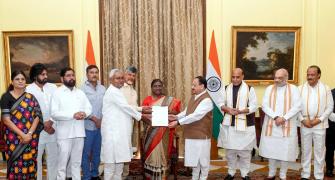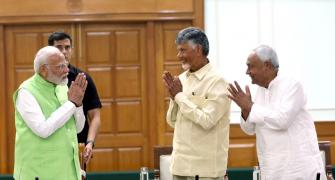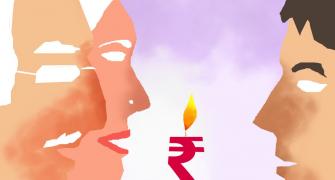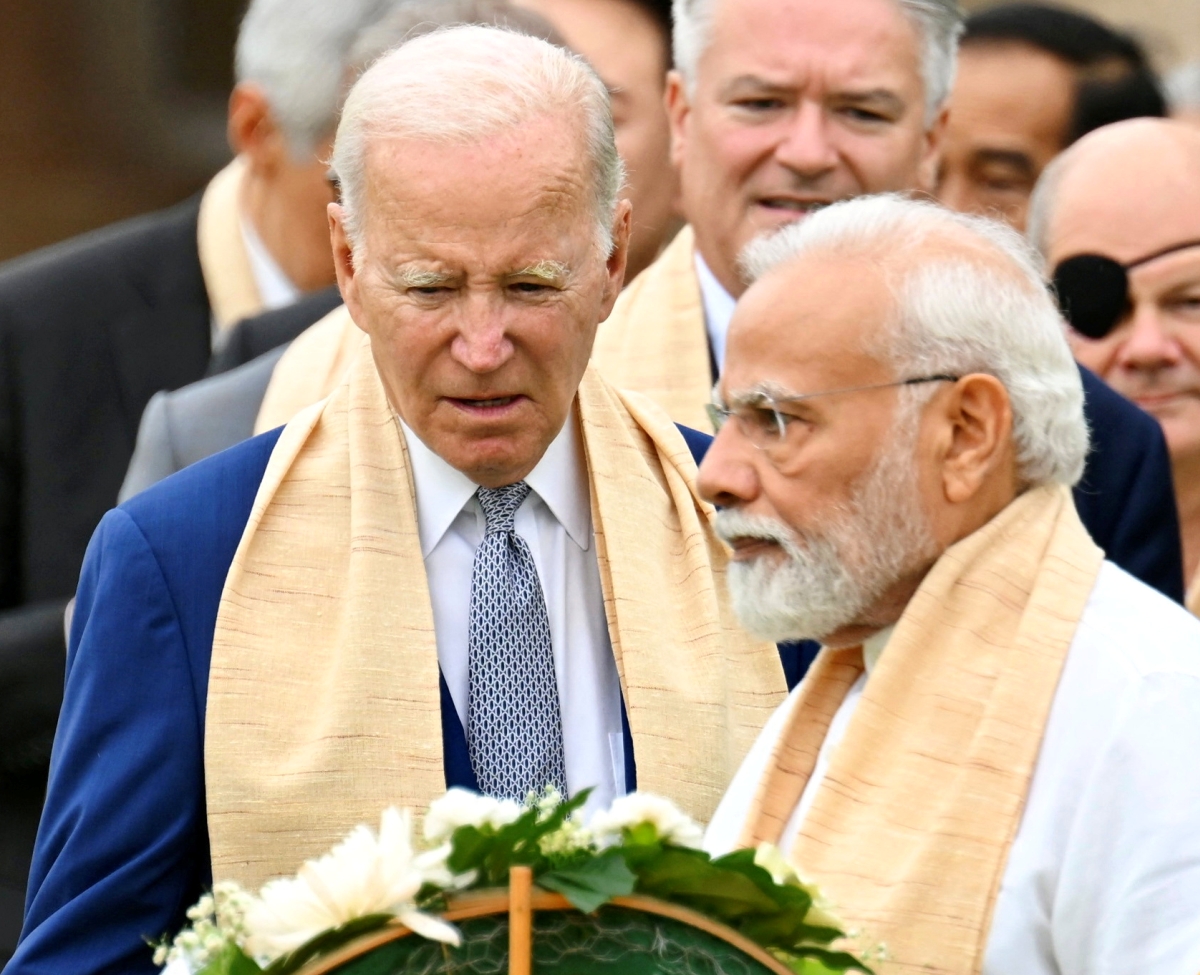The biggest challenge will be to convert his regime into a coalition of minds.
But given the fact that he is instinctively an authoritarian leader and supporter of the hard Hindutva line, the survival of his government will depend on his ability to balance between his heart and mind, between instinct and pragmatism, asserts Nilanjan Mukhopadhyay, author of Narendra Modi: The Man, The Times.

Will Narendra Modi be able to successfully run a coalition government?
This question has been repeatedly asked since the day he secured the numbers to govern, but not the mandate.
Part of the reason why there is no ready answer to this question, especially in the affirmative, is because Modi does not have the track record of being a team player at any time in his political career of more than five decades.
Yet, the answer cannot also readily be completely in the negative, because in the course of his career, especially as prime minister since 2014, he has at times shown himself as a pragmatist and rolled back decisions once they hit a roadblock -- witness for instance the decisions to withdraw the laws on land acquisition and farm reforms.
But because such instances were rare, the question stays.
Modi has been in denial since the verdict.
Starting with the 'victory' ceremony and speech in the Bharatiya Janata Party headquarter in New Delhi on June 4, to the claims made while addressing the meeting of the National Democratic Alliance that elected him as the coalition's leader, Modi neatly sidestepped the issue that he failed in leading the party to its third successive parliamentary majority.
While the governments that assumed office in 2014 and 2019 were 'Modi Sarkar', the one being sworn-in now is a NDA government.
Significantly, the central BJP slogan during the entire length of the election campaign was Modi Ki Guarantee.
This was a guarantee for promises to people, as well as the rank and file of the BJP and other affiliates in the Sangh Parivar.
Despite failing to deliver the guaranteed victory, Modi has not providing any explanation to his own.
Instead, speeches at the 'victory ceremony' in the BJP office on June 4 by him, and his loyal party president, were neatly converted into a celebration for leading the coalition to a majority.
While in his public proclamations he may choose to make no such admission, within his own self the admission must be made that he has been way off from the targeted tally.
The results must also be discussed threadbare within his party too for him to make a fresh beginning and regain the lost halo of a leader who never loses electoral battles.
Continuing to be in denial and not providing an opportunity to his party leaders to vent their minds on his failure and examine what went wrong, would further queer the pitch within the BJP where enthusiasm was low during the election campaign.
Besides his coalition partners, Modi will have to secure the confidence of not just his entire party, not just a handful of chosen party loyalists and aides, but also the entire Sangh Parivar.
Even before the last vote had been cast, party president JP Nadda contentiously declared that the party had become saksham (competent), as a result of which, it was no longer dependent on the RSS.
The statement, which ruffled feathers within the ideological fountainhead, was obviously made after due deliberation with Modi.
Undeniably, any claim of such crucial importance could not have been by a leader with little clout that Nadda has remained despite being president since 2019.
Modi is temperamentally a soloist.
The space for others on the proscenium while he is playing can at best be that of the chorus. This tendency could be the biggest reason for the undoing of Modi 3.0. From his childhood he wanted the spotlight to be solely on him.
One of his school teachers told me while I was researching on the biography of his that I wrote, that as a child, Modi liked to be on stage and act in plays.
But he always wanted only the lead role - secondary roles were not acceptable to him.
His teacher had also, very significantly, told me that Modi never liked to be judged by his peers, that he considered himself to above them.
It is twenty three years since Modi occupied a constitutional office for the first time.
From the time that he became the chief minister of Gujarat in October 2001, Modi has been an authoritarian leader who governed with the assistance of a small coterie of officials and had little respect for the Cabinet system of governance.
Barring a few who he had to include in his council of ministers due to political compulsions, his ministers merely became implementers of decisions that were already taken by the ubiquitous prime minister's office and the chief minister's Office prior to 2014.
The first action that he will now have to take, after negotiations for portfolios and Constitutional posts like that of the Speaker is concluded with coalition partners, is to whittle down the PMO and give greater elbow room to ministers insofar as the decision-making process is concerned.
Modi's problem will be accentuated by the fact that he has to not only work with coalition partners on issues of governance and policies, but also on his politics, particularly his electoral vocabulary.
Assembly elections are due in Maharashtra, Jharkhand and Haryana within months and in his urgency to restore the party's electoral dominance, he cannot use the pitch that he did in the course of the Lok Sabha elections.
Modi's overarching national narratives during elections have almost always been constructed a corrosive version of Hindutva, and this cannot be used while heading a coalition.
Will he then be able to ensure that the series of M-words he used in the course of the parliamentary campaign are exorcised from his speeches?

Attempting to polarise the electorate on lines of religious identity has for long been Modi's second nature.
He could easily resort to such expressions as long as he did not have electoral partners who have 'problems' with sectarian discourse because it jeopardised sections of their supporters.
As a leader who has pledged to seek consensus, he will have to allow greater debate and accept criticism. This would mean scaling down efforts to throttle, the media, the civil society and democratic protests.
Silence which became the hallmark of his regime when he needed to speak against communal attacks on religious minorities will have to be replaced by prompt action against offenders.
The biggest challenge will be to convert his regime into a coalition of minds.
But given the fact that he is instinctively an authoritarian leader and supporter of the hard Hindutva line, the survival of his government will depend on his ability to balance between his heart and mind, between instinct and pragmatism.
But, having been his own man for so long and done what he pleased, this will not be a very easy task.
Nilanjan Mukhopadhyay is an author and journalist based in Delhi-NCR. His latest book is The Demolition, The Verdict and The Temple: The Definitive Book on the Ram Mandir Project. He is also the author of Narendra Modi: The Man, The Times.
Feature Presentation: Ashish Narsale/Rediff.com










